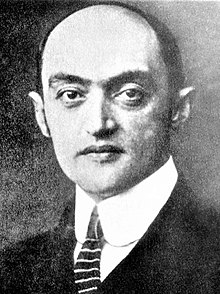Joseph Schumpeter
Joseph Alois Schumpeter (8 Februari 1883 - 8 Januari 1950)[1] adalah seorang ekonom Amerika-Austria dan ilmuwan politik. Dia sempat menjabat sebagai Menteri Keuangan Austria pada tahun 1919. Salah satu ekonom paling berpengaruh dari abad ke-20, Schumpeter mempopulerkan istilah "destruksi kreatif" dalam ekonomi.[2]
| Joseph Schumpeter | |
|---|---|
 | |
| Lahir | 8 Februari 1883 Triesch, Moravia, Austria–Hungary (sekarang Třešť, Czech Republic) |
| Meninggal | 8 Januari 1950 (umur 66) Taconic, Connecticut, U.S. |
| Institusi | Harvard University 1932–50 University of Bonn 1925–32 Biedermann Bank 1921–24 University of Graz 1912–14 University of Czernowitz 1909-11 |
| Bidang | Ekonomi |
| Mazhab | Sejarah Sekolah |
| Alma mater | University of Vienna |
| Dipengaruhi | Tocqueville, Marx, Spencer, Menger, Böhm-Bawerk, Wieser, Schmoller, Weber, Sombart, Durkheim, Walras, Pareto, Juglar, Kondratiev, Wicksell, Wicksteed |
| Kontribusi | Siklus bisnis Perkembangan ekonomi Kewirausahaan Ekonomi evolusioner |
| |
Referensi
sunting- ^ Liberty Fund, Inc. (2007-10-08). "Joseph Alois Schumpeter: Biography". Econlib.org. Diakses tanggal 2010-09-21.
- ^ Stone, Brad; Vance, Ashlee (January 25, 2009). "$200 Laptops Break a Business Model". New York Times. Diakses tanggal 2010-09-21.
Indeed, Silicon Valley may be one of the few places where businesses are still aware of the ideas of Joseph Schumpeter, an economist from Austria who wrote about business cycles during the first half of the last century. He said the lifeblood of capitalism was 'creative destruction.' Companies rising and falling would unleash innovation and in the end make the economy stronger.